Who Won the Battle of Britpop
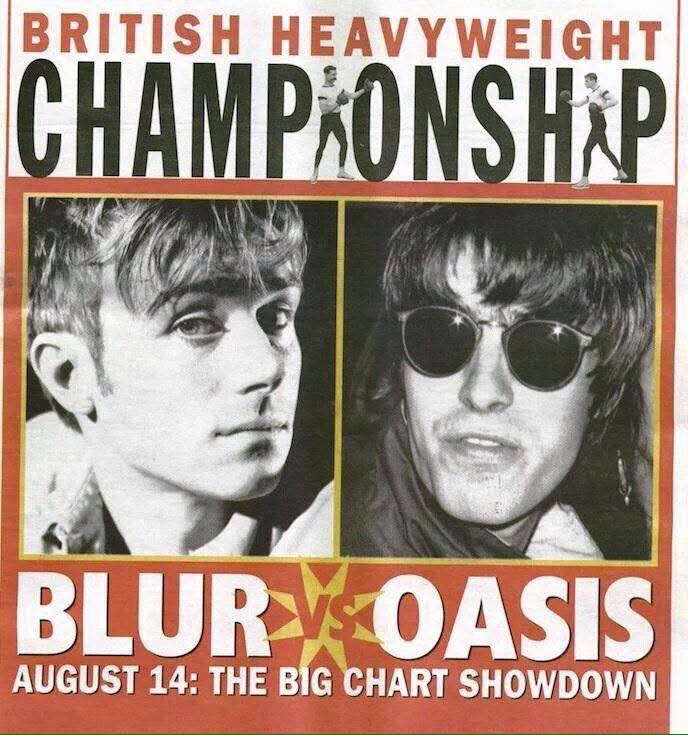
The Battle of Britpop became more than just Oasis vs Blur. It became so much more; the media would portray it as the North vs the South, the working class vs the middle class, swagger vs art-school irony, guitars-in-the-pub vs clever satire in Camden. What started as a chart rivalry was inflated into a national identity debate, a cultural referendum on who truly represented the British public in 1995.
The Battle
What was the Battle of Britpop?
A chart battle between Oasis and Blur, the clash had come after a period of genuine mutual admiration. Damon Albarn of Blur had said at the 1995 Brit Awards, when the band won Best British Group, “This should be shared with Oasis,” with Graham Coxon adding, “Much love and respect for them.” At that moment, the two bands seemed united by a shared mission: to put British guitar music back at the centre of culture.
A few months later, Albarn would go on Chris Evans' radio show and compare Oasis to Status Quo. Oasis would hit back at Blur, though, Alan McGee recalls when Damon attended an Oasis party. “Damon had come to a party [at the Mars Bar in Covent Garden] for Oasis being Number One [for ‘Some Might Say’, their first Number One single]. Liam went up to Damon, saying, ‘We’re Number One, you’re not, you’re not,’ and Damon got on one about it and decided to take Oasis on. Oasis, being Oasis, decided to hate them. And Blur, being Blur, thought it was a game, but Oasis actually fucking hated them at the time! I used to go see Chelsea a lot in the ’90s, and I regularly met up for a pie and Bovril with Damon at half-time. To be fair, I think he was quite unaware that Oasis were so serious about it.”
Albarn also recounts this event: “When Oasis got to Number One with ‘Some Might Say’, I went to their celebration party, y’know, just to say ‘Well done’. And Liam came over and, like he is, he goes, ‘Number fookin’ One!’, right in my face. So I thought, ‘OK, we’ll see…'”
The battle lines had been drawn, and now it was a case of the two bands picking their weapons. Those weapons would be the first singles from their forthcoming albums. Blur's fourth, 'The Great Escape', and Oasis's second, ' (What's the Story) Morning Glory'. Blur picked 'Country House' and Oasis chose 'Roll With It'
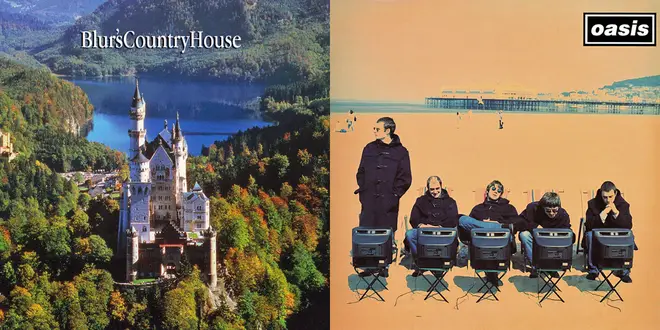
These were going to be the biggest singles of the year, and there's an irony that they both caused a mass amount of frenzy from the British public. As songs, they are poor examples of what both Blur and Oasis could do. 'Country House' is quite jovial, and it pandered to a certain element of the band's sound. However, it wasn't a patch on the singles that had been released for 'Parklife'.
Andy Ross of Food Records said about the single choice, “I remember the band were slightly reluctant to have ‘Country House’ as a single in the first place, and one or two people were reluctant about the video with Keith Allen and Page Three girls. But irrespective of how good the song itself was, it sounded like a Number One single. It’s like having a big gun. I’m not saying it’s pretty or nice, but it’s effective. It’s certainly not the best song they ever did, or probably even the best song on that album, but it served a purpose. The person who scores the goals isn’t necessarily the best player on the pitch.”
It has some good moments, and has some underrated lyrics, “blow me out/I am so sad/I don’t know why” at the end, is a great bit of songwriting. However, the video for the song really hasn't aged well!
'Roll With It' is probably the weakest song on '(What's the Story) Morning Glory', Tim Burgess from The Charlatans describes it as "a kind of flatpack Oasis song.” It's not a particularly bad song, but then again, it's also not an excellent one. It's Oasis by numbers, pounding drums, snarling guitars and a big chorus. The songwriting is not particularly special, especially when you consider what had come before and what was yet to come.
The plan had originally been that the singles would not compete for top spot. Andy Ross said, “The perceived way of things seems to be that the whole thing was rigged and arranged between the two bands, but we’d spent at least six months trying to prevent this from arising. The plan, if there was a plan, was that Oasis would have a Number One, then we would, or vice-versa, and they wouldn’t clash. Our lines of communication were pretty rock solid. But then, for some unexpected reason from our point of view, they brought forward their single by something like six weeks, weeks and weeks ahead of schedule. That threw us into complete confusion. All of a sudden, they’re going to put their record out before ours. So our thinking – ‘us’ being myself, Damon and [Parlophone chief] Tony Wadsworth – was that if we were to release our record a week after theirs, not only would we be up against Oasis, we’d be up against the sales of a new Number One single, which could add an extra 50 per cent because of all the exposure a Number One would get anyway. We’re on a hiding to nothing. They’re guaranteed a Number One, but they’ve got a strong possibility of continuing to have the Number One the week we put our record out. So there’s a very strong chance we’ll go in at Number Two, which would be sort of a disaster, because this has been very carefully worked out.”
Alan McGee also recounts this story, “We were gonna go the week after them, I believe, and they were going the week before us. It might have been the other way around; I can’t remember.
The dates were then moved by Blur's camp. It was set, August 14th 1995. The NME ran with the story, "Yes, in a week where news leaked that Saddam Hussein was preparing nuclear weapons, everyday folks were still getting slaughtered in Bosnia, and Mike Tyson was making his comeback, tabloids and broadsheets alike went Britpop crazy."
Billed as the greatest pop rivalry since the Beatles and the Rolling Stones, it was spurred on by jibes thrown back and forth between the two groups, with Oasis dismissing Blur as "Chas & Dave chimney sweep music", while Blur referred to their opponents as the "Oasis Quo" in a deriding of their alleged unoriginality and inability to change.
In what was the best week for UK singles sales in a decade, on 20 August, Blur's 'Country House' sold 274,000 copies against 'Roll with It' by Oasis, which sold 216,000, the songs charting at number one and number two, respectively.
Blur's gamble had worked.
Blur performed their chart-topping single on the BBC's Top of the Pops, with the band's bassist Alex James wearing an 'Oasis' t-shirt.
Oasis, meanwhile, would perform on the show, with Noel and Liam reversing roles, the band making a dig at the establishment and the fact that they were expected to mime on the show.
So Blur won the battle, but there was more to come. A lot more.
In more recent years, both Noel Gallagher and Damon Albarn have reflected on the time. In a 2019 interview, Oasis bandleader Noel Gallagher reflected on the chart battle between the two songs, both of which he saw as "shit", and suggested that a chart race between Oasis's 'Cigarettes & Alcohol' and Blur's 'Girls & Boys' would have had greater merit. He also noted that he and Blur frontman Damon Albarn, with whom Gallagher had enjoyed multiple musical collaborations during the 2010s, were now friends.
Both men have noted that they do not discuss their 1990s rivalry, with Albarn adding, "I value my friendship with Noel because he is one of the only people who went through what I did in the Nineties."
The War
Following the release of the two singles, the band would go on to release their albums. Blur would release 'The Great Escape' on the 11th September 199,5 with Oasis releasing '(What's the Story) Morning Glory' on the 2nd October 1995.
Blur's album the third in their 'Life' trilogy would go on to sell a million copies, and featured some of the band's most loved tracks, including 'Charmless Man' and 'The Universal'. At the time the album was universally loved, David Cavanagh in Select called it "a funny, brave and heartbroken record" that "has everything you could want" while NME reporter Johnny Cigarettes wrote: "The Great Escape is so rammed with tunes, ideas, emotions, humour, tragedy, farce, and edgy beauty that it's utterly beyond contemporary compare.
However, in recent years, the album has been reevaluated, and the common consensus by critics and even the band itself is that the record isn't very good. Albarn considered the album to be "messy", and critics took back their high levels of praise.
'The Great Escape' isn't a bad record, it just isn't 'Parklife' or '(What's the Story) Morning Glory'. Drowned in Sound reporter Marc Burrows felt the LP had been overrated and then underrated, writing: "Reality is somewhere in between... The Great Escape reveals itself as flawed, melancholy, occasionally stunning and utterly bonkers."
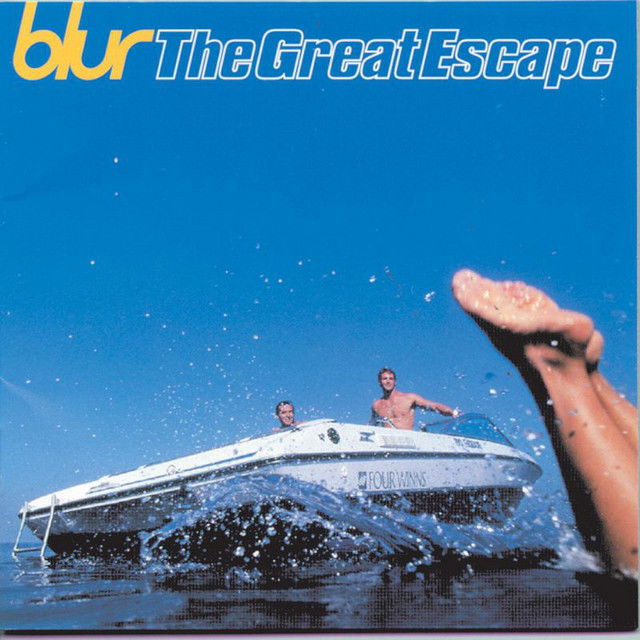
Blur do some really good stuff on this record. The band's two previous efforts had seen Albarn examine characters from 'Tracy Jacks' to 'Colin Zeal', and there had always been a jovial, comedic nature to them. With 'The Great Escape', there's a more sinister edge to the songwriting, the characters are more sleazier, less likeable, and the songwriting is much darker. 'Charmless Man' is one of the best examples of this.
Albarn was also writing more about himself. 'Dan Abnormal' is an anagram of Damon Albarn. The band was also writing about what was going on at the time. 'It Could be You', for example, was taken from the original advertising slogan of the United Kingdom's multimillion-pound prize National Lottery, which had drawn much public interest after its inception the previous year.
This album also gives Blur their definitive Britpop moment, 'The Universal', a sweeping epic that weeps spiritual buckets. While on the surface, the lyrics may appear optimistic, they are underpinned by a sense of irony and scepticism. Lines like “It really, really, really could happen” initially sound like a hopeful mantra, but in context, they seem to express doubt or even fear. Albarn writes about a society where instant gratification and endless distraction are now the norm. Technology is taking over, and the idea of what was once dystopian is now becoming very real. It's exceptional, even thirty years on!
'(What's the Story) Morning Glory' would go on to sell over four million copies in the UK, becoming the fifth best-selling album in UK chart history. Featuring 'Wonderwall', 'Don't Look Back in Anger' and 'Champagne Supernova', it's easy to see why it became one of the best-selling British albums ever. In the UK, four singles were released: 'Some Might Say' and 'Don't Look Back in Anger' hit the top spot, and 'Roll With It' and 'Wonderwall' peaked at Number Two. The latter has emerged as the band's biggest-selling UK hit, spending 30 consecutive weeks on the chart.
In America, 'Champagne Supernova' and 'Wonderwall' reached number one on the Billboard Alternative Songs chart. At the 1996 Brit Awards, the album won Best British Album, beating 'The Great Escape'
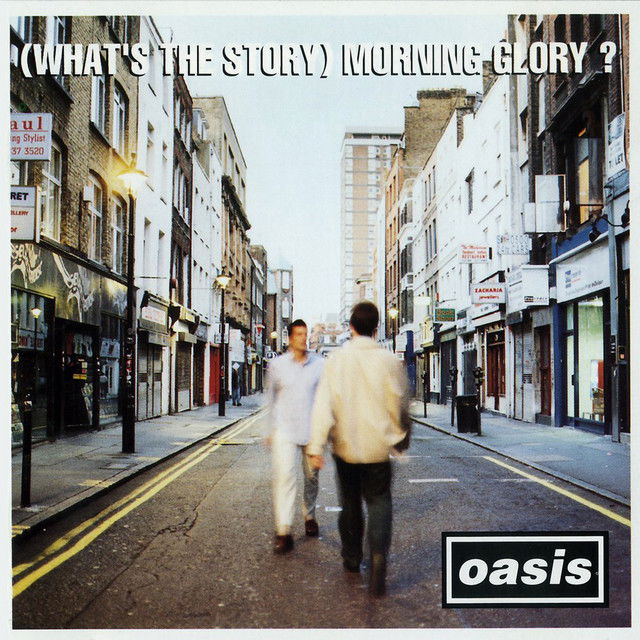
With the critics, '(What's the Story) Morning Glory' had the opposite life to Blur's album. At the time, it received lukewarm reviews from critics; many reviewers deemed it inferior to 'Definitely Maybe', with the songwriting and production being particular points of criticism.
David Cavanagh of Q magazine said of the lyrics: "They scan; they fill a hole; end of story. They [say] nothing much about anything." Andy Gill of The Independent commented that "She's Electric" is "laddism of a tiresomely generic kind", while "Roll with It" is "drab and chummy".
While stating that "Some Might Say" was "the best single of the year", David Stubbs of Melody Maker was critical of the album as a whole; "What's the Story sounds laboured and lazy. On this evidence, Oasis are a limited band ... they sound knackered." NME was more enthusiastic, with the magazine's John Robinson writing that the album shows Oasis pursuing "an altogether different direction; away from the conscience-free overloaded hedonism towards an understanding of its consequences"
In his book Britpop!, John Harris concluded that the initial negative reviews of the time missed the album's universal strengths. "Those who fussed about the music's more artful aspects were missing the point. The fact that [Noel's] songs contained so many musical echoes seemed to couch the album in an air of homely reassurance." Harris believed that the "ordinary" nature of some of the album's songs "turned out to be part of its deeply populist appeal".
The album has appeared on several lists of the greatest albums in rock music, and at the 2010 Brit Awards, it was named the greatest British album since 1980. It has sold over 22 million copies worldwide, making it one of the best-selling albums of all time. As of July 2025, the album has been certified 18× platinum by the British Phonographic Industry (BPI) for selling 5.4 million copies in the United Kingdom.
As an album, it's easily the most iconic Oasis record, and the one that most people listen to first when getting into the band. It's the singles, including 'Some Might Say' have gone on to become a part of the furniture in Britain. As I sit and write this post, in a house party, a dimly lit pub, or a teenager's bedroom, the first chords to 'Wonderwall' will echo out from an acoustic guitar.
'Don't Look Back in Anger' has gone to become an anthem for defiance. Following the Manchester Arena attack in 2017, the song became an anthem of defiance, unity, and resilience. On the 25th May 2017, three days after the attack, mourners gathered in St Ann's Square to pay their respects. Following a period of silence, one mourner, Lydia Bernsmeier-Rullow, began to break into the opening verse of 'Don't Look Back in Anger. The crowd of people joined in.
They were singing because they needed something that made sense, something familiar, powerful, and healing. When politicians and the powers at be could not provide the help and support. Manchester rallied around a song.
Don't Look Back in Anger' is one of those songs woven so deeply into the cultural fabric that it feels like it's always been there. It echoes through football stadiums, fills pub gardens after last orders, and sits permanently on the playlist of every busker, wedding DJ, and indie discos. It's been sung in joy and grief, at parties and vigils, in defiance and remembrance. It's passed down from siblings, learned by osmosis, blasted from radios and shouted from terraces. And no matter where you're from, whether you grew up with Britpop or discovered the song decades later when that chorus hits, you're part of something bigger. It's more than a song now. It's a unifier, an unofficial British hymn.
Following the release of the record, the band would go on their biggest ever tour. Which included shows at Glastonbury, Earls Court, dates in America and two gigs at Manchester City football stadium Maine Road, two nights at Loch Lomond in Scotland, and two nights at Knebworth House in front of a record 125,000 people each night; an event that would come to be acknowledged as the height of the Britpop phenomenon, with one journalist commenting; "(Knebworth) could be seen as the last great Britpop performance; nothing after would match its scale."
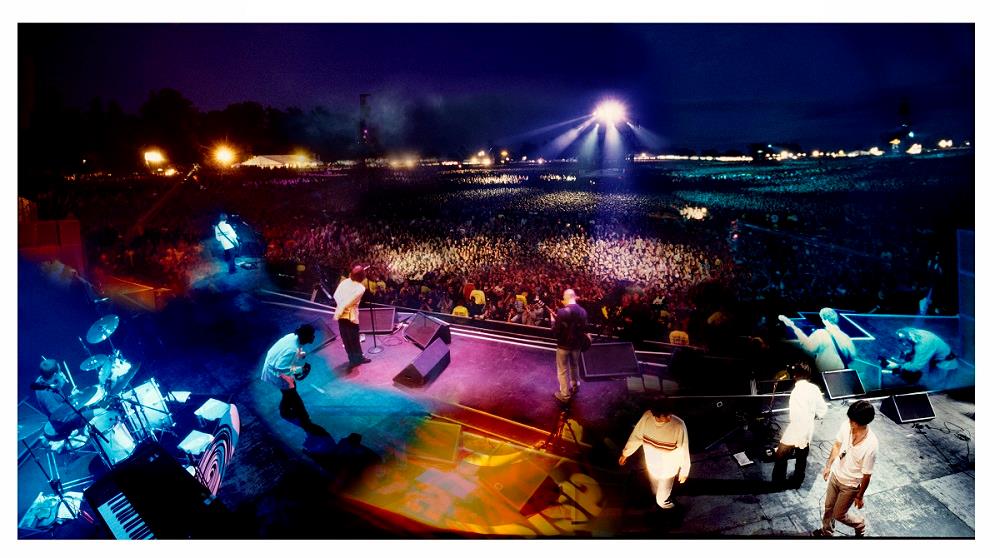
At the time, the concerts were the biggest gigs ever held for a single band on UK soil, and to date, remain the largest demand ever for a British concert, with reportedly over 2.5 million applications for tickets.
Aftermath
So Blur won the battle, and then Oasis won the war. However, I don't think the story is over. Oasis became the biggest band in the world, and Blur retreated into themselves. What would happen next, I don't think many saw coming.
In 1997, Oasis were riding the Knebworth wave, and everyone wanted a piece of them. Tony Blair would invite Noel Gallagher to 10 Downing Street. Britpop had become part of the official branding of “Cool Britannia,” blending youth culture with politics in a way that made some artists uncomfortable.
Oasis would release their third album in 1997, 'Be Here Now', and for many, it was the start of the end of Britpop. Recording began on 7 October 1996 at EMI's Abbey Road Studios in London. Owen Morris, the producer, described the first week of sessions as “fucking awful” and suggested to Noel that they abandon the session: “He just shrugged and said it would be all right. So on we went.” Liam was under heavy tabloid focus at the time, and on 9 November 1996, was arrested and cautioned for cocaine possession at the Q Awards. A media frenzy ensued, and the band's management made the decision to move to a studio less readily accessible to paparazzi.
On 11 November 1996, Oasis relocated to the rural Ridge Farm Studio in Surrey. Though they reconvened with more energy, the early recordings were compromised by the drug intake of all involved. Morris recalled that “in the first week, someone tried to score an ounce of weed, but instead got an ounce of cocaine. Which kind of summed it up.”
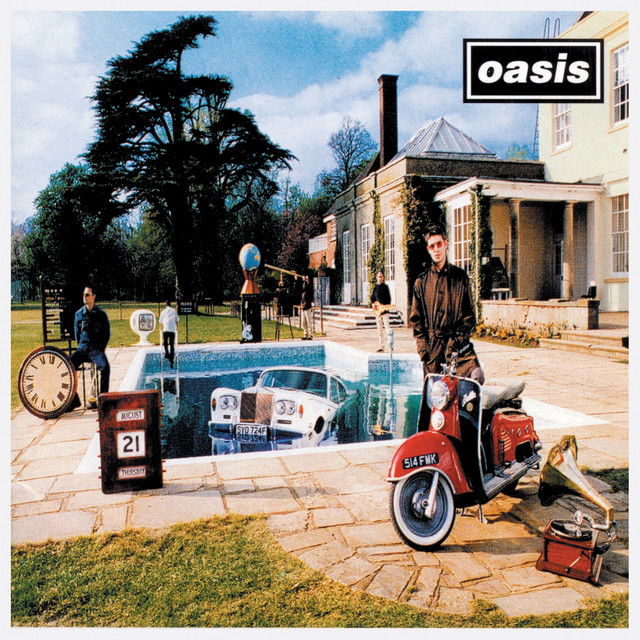
Noel was not present during any of Liam's vocal track recordings. Morris thought that the new material was weak, but when he voiced his opinion to Noel, he was cut down: “[So] I just carried on shovelling drugs up my nose.” Morris had initially wanted to just transfer the Mustique demo recordings that he and Noel had recorded earlier in 1996 and overdub drums, vocals, and rhythm guitar, but the 8-track mixer he had employed required him to bounce tracks for overdubs, leaving him unable to remove the drum machine from the recordings.
That didn’t happen; Noel, in particular, wanted the album to sound dense and colossal, and in the end, it ended up sounding bloated and overblown. In many instances, he dubbed ten channels with identical guitar parts in an effort to create a sonic volume.
And that excess carried into the songs themselves. Where 'Definitely Maybe' and '(What’s the Story) Morning Glory?' had punch and concision, 'Be Here Now' sprawled. 'D’You Know What I Mean?' opens the album at over seven minutes, its huge walls of guitars and Morse-code samples announcing a band determined to be loud, long, and larger than life. 'My Big Mouth' and 'I Hope, I Think, I Know' both push past five minutes with relentless riffing, while 'Fade In-Out' drags into the six-minute mark, complete with Johnny Depp playing slide guitar during a tequila-soaked session. Even what should have been the big emotional centrepiece, 'Don’t Go Away', stretches toward five minutes, its lush strings and layered vocals swelling far beyond Noel’s original demo.
But nothing epitomises the album’s excess more than 'All Around the World'. Noel had written it years earlier, waiting for the moment Oasis would be “big enough” to justify its ambition. At over nine minutes and with the reprise versions later tacked onto the tracklist, it became a symbol of the band’s maximalist mindset: strings, key changes, choirs, and three separate codas. The length wasn’t just indulgence; it was Oasis declaring that they could do anything, and that no one was going to stop them.
In later years, Noel Gallagher would become increasingly critical of the album, calling it “the sound of a bunch of guys on coke, not giving a fuck.” He admitted that many songs were stretched far beyond their ideal length, joking that if they’d simply shaved two minutes off every track, fans might talk about 'Be Here Now' very differently.
At the time, reviews of 'Be Here Now' were unanimous in praise; critics did not want to come undone as they had done with the previous record. John Harris said, "To find an album that had attracted gushing notices in such profusion, one had to go back thirty years, to the release of Sgt. Pepper's Lonely Hearts Club Band.". However, since the reviews have been less kind, with many commenting on the length of songs and the production.
In 2020, Luke Holland of The Guardian described Be Here Now as a "flawed masterpiece", writing that "as a snapshot of 90s excess – a bygone age of pig-headed rock-star bravado.
The best review of 'Be Here Now' comes from the 2003 John Dower-directed documentary Live Forever: The Rise and Fall of Brit Pop, music critic Jon Savage pinpointed Be Here Now as the moment where the Britpop movement ended. Savage said that while the album "isn't the great disaster that everybody says", he noted that "[i]t was supposed to be the big, big triumphal record" of the period.
Oasis would never be the same band again.
Whilst Oasis had been making the album that journalists said killed Britpop. Blur were in Iceland making the album that actually killed the movement.
An early 1996 Q magazine interview revealed that relations between Blur members had become very strained; journalist Adrian Deevoy wrote that he found them "on the verge of a nervous breakup". Coxon, in particular, began to resent his bandmates: James for his Playboy lifestyle, and Albarn for his control over Blur's musical direction and public image.
The guitarist struggled with drinking problems and, in a rejection of the group's Britpop aesthetic, made a point of listening to noisy American alternative rock bands such as Pavement. In February 1996, when Coxon and James were absent for a lip-synced Blur performance broadcast on Italian television, they were replaced by a cardboard cutout and a roadie, respectively. Blur biographer Stuart Maconie later wrote that, at the time, "Blur were sewn together very awkwardly"
Although he had previously dismissed it, Albarn grew to appreciate Coxon's tastes in lo-fi and underground music, and recognised the need to significantly change Blur's musical direction once again. "I can sit at my piano and write brilliant observational pop songs all day long, but you've got to move on", he said. He subsequently approached Street and argued for a more stripped-down sound on the band's next record. Coxon, recognising his own personal need to, as Rowntree put it, "work this band", wrote a letter to Albarn, describing his desire for their music "to scare people again". After initial sessions in London, the band left to record the rest of the album in Iceland, away from the Britpop scene
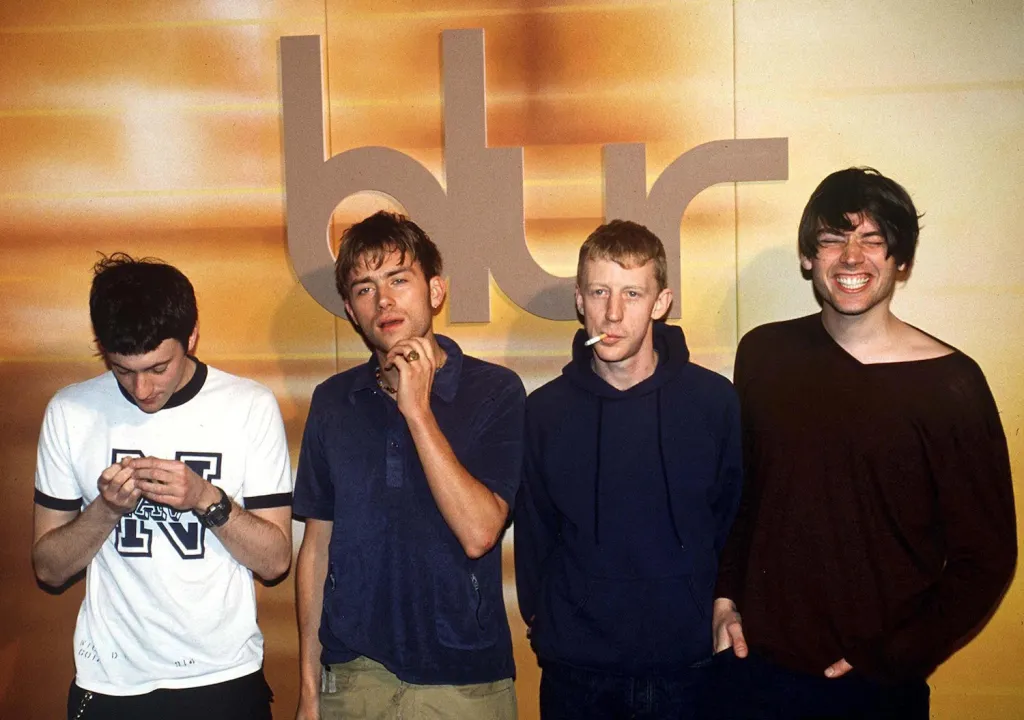
In January 1997, Blur released the first single from their new album 'Beetlebum'. Written about Blur frontman Damon Albarn's experiences with heroin, the song features Beatles-influenced music and a mood that Albarn described as "sleepy" and "sexy". Despite fears of the song's uncommercial nature, the single debuted at number one on the UK Singles Chart, becoming Blur's second track to top the chart.
This stark departure in sound brought Blur back from the brink. If fans were shocked by 'Beetlebum', then the album's second single had a profound effect. 'Song 2' was unlike anything Blur or any of the other Britpop bands had done before; it's a grunge song.
It reached number two on the UK Singles Chart, and in America, it was popular on radio stations. Consequently, it went to number 55 on the Hot 100 Airplay chart, number 6 on Billboard's Modern Rock Tracks chart, staying on that chart for 26 weeks, and number 25 on the Mainstream Rock Tracks chart.
The success of the song would lead 'Blur' to become the band's most successful album in America.
'On Your Own', the album's third single, would become a cornerstone for Albarn. In the years since, Albarn has described the song as one of the first ever Gorillaz tunes, if you want to look at how things sort of develop,” he told Australia’s TripleJ in 2010. “That was definitely a moment where I thought, I quite like doing it this way as well. I definitely ripped off Blur with Gorillaz. If Blur want to sue me, no problem.”
Critics have also said that 'Death of a Party' influenced the virtual band, with comparisons made to The Specials.
'Blur' also features the first Blur song, which Coxon sings and wrote the lyrics for, 'You’re So Great' , a shambling, alcoholic love ballad which is heartbreaking in its directness. Coxon was reportedly so shy about performing it that he sang and played it underneath a table in the Mayfair studio.
Despite the influence of Coxon and America, there's so much more to 'Bur', 'M.O.R', for example, which borrows its chord progression from David Bowie’s 'Boys Keep Swinging' and 'Fantastic Voyage,' both from 'Lodger', and both songs which originally came out of Bowie and Brian Eno’s experimental period together in Berlin.
Blur proved that they could nurse the wounds they'd gained from the war with Oasis, and continue to release innovative music, 'Blur' is some of the bands finest work, and it's follow up '13' would feature some of the bands most well loved songs including the Coxon written and sung 'Coffee and TV' and the grandiose epic 'Tender'.
Reunions
Well, Blur won the battle, Oasis won the war, and then Blur came back from the brink. The story doesn't end there, though. Blur would break up after 'Think Tank', an album completed without Coxon, who had left the group. Albarn would focus on 'Gorillaz'.
Oasis would release material throughout the 2000s, and it's patchy; there are some career highlights, including 'Little by Little', 'Stop Crying Your Heart Out' and 'Lyla'. They would break up in 2009.
Blur, meanwhile, would reunite that same year, playing some huge shows including two in Hyde Park and a slot headlining the Pyramid Stage at Glastonbury. In January 2010, No Distance Left to Run, a documentary about the band, was released in cinemas and a month later on DVD.
In April 2010, Blur released their first new recording since 2003, 'Fool's Day', for the Record Store Day event, as a vinyl record limited to 1000 copies; it was later made available as a free download on their website. In February 2012, Blur were awarded the Outstanding Contribution to Music award at the 2012 Brit Awards. Later that month, Albarn and Coxon premiered a new track together live, 'Under the Westway'
That August, Blur headlined a monumental show at Hyde Park as part of the 2012 Summer Olympics closing ceremony. The performance was a celebration not only of the Games but of British culture and music history, drawing a vast crowd. It also saw the band give fans a debut to 'Under the Westway'
In April 2015, Blur released their first studio album in twelve years, 'The Magic Whip'. An album that was written and conceived in Hong Kong, following a few cancelled dates in Japan, it marked a long-awaited return for the band after a 12-year hiatus. It was also a reunion in the truest sense: Graham Coxon was back, having been largely absent from the band’s previous record, and Stephen Street returned to the producer’s chair, bringing a sense of continuity and polish to the project.

The making of the album was unusual and somewhat fragmented. Although the songs were written and initially recorded together in Hong Kong, it was Coxon who took the tracks to Street while Albarn was on tour, allowing James and Rowntree to contribute parts in secret recording sessions. The music was eventually presented to Albarn, and the rest is history.
Blur then went back on another hiatus. It seemed like the end. They had come back, played some huge shows, rekindled the friendship and even released new music. In the form of new singles and even a new album. Would Blur do any more?
It took Blur 7 years to make the next announcement. Yes, they had briefly reunited in 2019 at an Africa Express event organised by Albarn. However, it wasn't until 2022 that they would announce something. On 14th November 2022, Blur announced a huge Wembley Stadium date for Saturday 8 July 2023. Blur's biggest UK gig to date.
Albarn said, "We really love playing these songs and thought it's about time we did it again”. Coxon also stated, "I'm really looking forward to playing with my Blur brothers again and revisiting all those great songs. Blur live shows are always amazing for me: a nice guitar and an amp turned right up and loads of smiling faces.”
On November 18th, Blur announced a second date at Wembley for Sunday, 9 July 2023. In April, Blur would announce further dates in Europe and Asia. Performing in Madrid, Porto, Dublin, Amsterdam, Normandy, London, as well as a string of huge European Festivals. Before jetting off to Japan, and then ending the tour in South America, with some November dates.
On May 18th 2023, Blur announced new music, the first single from their upcoming ninth studio album, 'The Ballad of Darren'.
'The Narcissist' was an exceptional return to form for the band, a song the band have described as 'an aftershock, reflection and comment on where we find ourselves now”, looking back at the friends he has lost: Bobby Womack, Tony Allen and late tour manager, Craig Duffy and his wife.' It is not only one of the best songs of this year, but it is one of the best Blur songs ever. A snapshot of their whole career. In terms of a comeback single, it doesn't feel like one.
The Ballad of Darren' is some of the band's best work. It is memorable and touching, full of emotion. You can feel what the band are going through with each line sung by a fragile front man, and each note played by his three best friends. Whatever they are going through, they are facing it together. This sense of friendship has strengthened over the years. As has the relationship with the Blur faithful.
“I gave a lot of heart, so did you / Standing in the back row, this one’s for you”, Albarn sings on the album's final song, 'The Heights.'
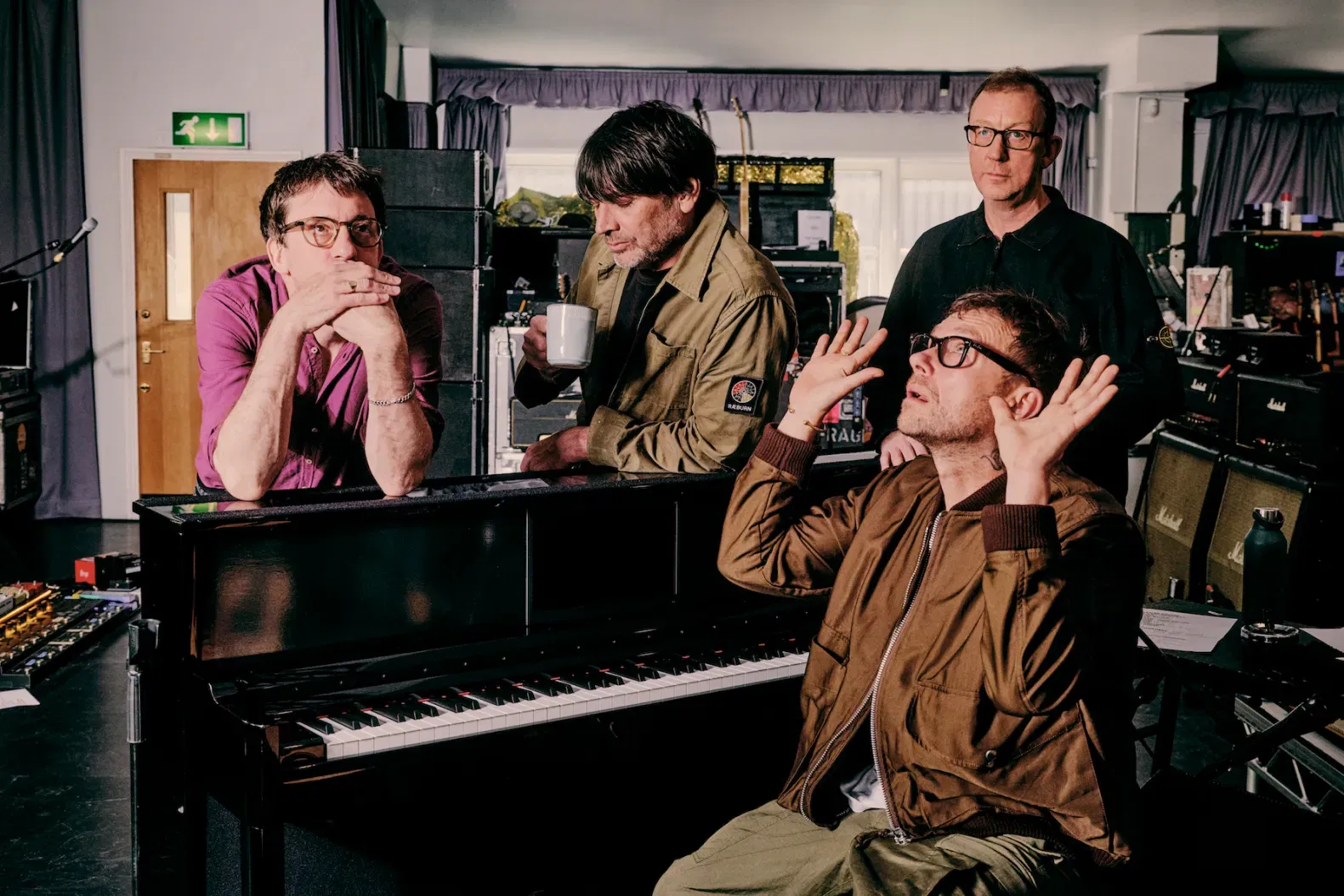
'The Ballad of Darren' was born out of the gang getting back together, and the four members experiencing the friends they have lost. This album is for the people who have been there for Blur; even in its title, Blur has tried to appeal to their generation, those who have been on this journey with them. Darren refers to Blur’s security guard and resident, every man Darren “Smoggy” Evans. But the title is more than just a nod to an old friend, Darren is a name that is synonymous with the generation Damon, Graham, Alex and Dave grew up in, and that name seemed to lose favour with the public, in fact it dropped out of the Top 100 Boys Names in 1994 just as Blur began to win favour with the British public. There's something quite beautiful in that.
The Blur story feels like it's come to an end. I hope I'm wrong in that regard, but I can't see what they do next.
Following the breakup of Oasis, the brothers Gallagher went their separate ways. Liam initially formed Beady Eye with the remaining members of Oasis. Andy Bell, Gem Archer and Chris Sharrock.
Beady Eye released 'Different Gear, Still Speeding' in 2011, with the album receiving mixed reviews. Following this would be the band's second album, 'BE,' which was released in 2013. This saw the band tour again, and play at Glastonbury and a tribute night for the Charlatans' former drummer, Jon Brookes. A year or so later, Liam took to social media to announce the breakup of Beady Eye. Archer and Sharrock joined Noel's band, High Flying Birds, and Bell returned to his original band, Ride.
Noel formed a new band with himself as the frontman, Noel Gallagher's High Flying Birds. Noel's first solo album topped the chart and sold 820,000 copies, and featured the singles 'If I Had a Gun', 'AKA What a Life', and 'Everybody's on the Run'.
Noel continued to release new music. In 2015, he would release his second solo record, 'Chasing Yesterday', which featured the singles 'Riverman' and 'Ballad of the Mighty I'. He and his band, now backed up by Beady Eye members, were headlining festivals and playing arenas. The tour to support this album was one of Noel's biggest, which took him all over the world.
On this tour, Noel played one of the songs from 'Chasing Yesterday' and each night dedicated it to every Oasis fan in the room. That song was 'You Know We Can't Go Back'. The idea of an Oasis reunion did not appeal to him at all.
In 2016, the brothers worked together on a documentary titled 'Supersonic'. It documented the band during their formative years, culminating in the band headlining Knebworth in 1996. The film featured archive footage and off-screen interviews of members of the band and people surrounding the band at the time.
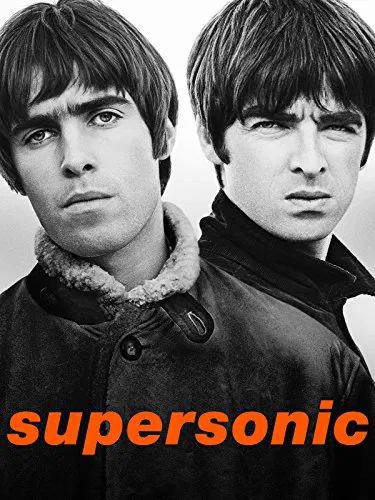
Despite not being the olive branch many thought it would be. The film sparked more and more interest in Oasis. A whole new generation of fans was exposed to the brothers Gallagher, a new, younger generation who were children when the band broke up. Myself included. This film is one of the biggest catalysts in the resurgence of Oasis.
After the breakup of Beady Eye in 2014, on the music front at least Liam Gallagher had been very, very quiet. However, his story wasn't finished. In 2017, Liam dropped his first solo track, 'Wall of Glass'. He would also do his first gig as a solo artist in June 2017. A small, intimate gig at Manchester's O2 Ritz with all proceeds going to victims of the Manchester terror attack.
On 4 June 2017, Gallagher made a surprise appearance at the One Love Manchester benefit concert, where he played 'Rock 'N' Roll Star', 'Wall of Glass', and 'Live Forever' alongside Coldplay's Chris Martin and Jonny Buckland. Many thought this was the concert where the brothers would reunite. However, Noel was not present in Manchester that night. He had been donating money to the victims of the attack, but many, including myself, thought that he would take to the stage that night.
His debut solo album was released in October 2017, and it was a critical and commercial success. The album debuted at number one in the UK, outselling the rest of the top 10 of the UK Albums Chart combined and achieving gold certification in its first week. It has since been certified platinum in the UK. It also achieved the highest single-week vinyl sales in 20 years, with 16,000.
Both brothers would continue to release solo music throughout the late 2010s and early 2020s. However, things had changed; Liam had become the more successful one. Liam would perform at Knebworth as a solo artist nearly 26 years after he performed there with Oasis
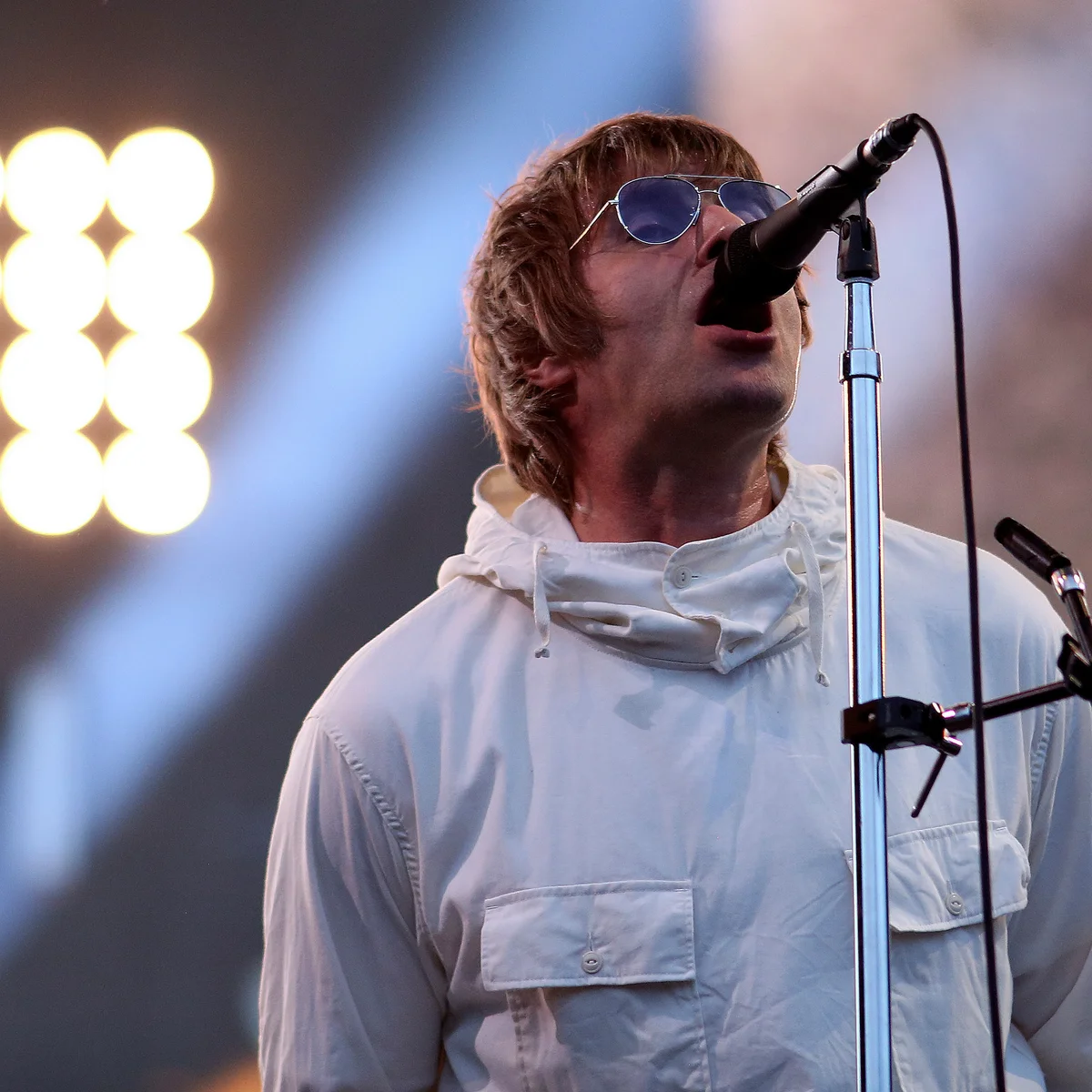
Liam, whilst Noel was on the decline, was on the up. He sold out those venues with ease. For many, this was the closest people were getting to an Oasis reunion. The younger Gallagher is firmly the spirit of Oasis. He was giving people who were too young the first time around to see a version of that.
On 16 October 2023, Liam announced that he would do a tour to mark the thirtieth anniversary of 'Definitely Maybe' in June 2024, where he would perform the album in its entirety alongside some of the B-sides from the album's singles. Many had speculated that Oasis might do something to celebrate these gigs. In February 2024, Liam confirmed that Noel had been asked to do the tour but had turned down the offer. Stating
“I did call him! Well, my people called Noel’s management team,” claimed Liam. “We put an offer on the table for an Oasis thing – because we got offered it – and he said no. It was a big tour, a lot of money. He turned it down. I get it, he’s got a divorce going down. I’ll do the ‘Definitely Maybe’ thing and have a nice time without him.”
August 27th 2024, rumours of an Oasis reunion had been prominent throughout 2024, and for the first time, it felt close.
8 am arrived on the 27th, and fans were braced to hear the news. News that for years seemed impossible. After 15 years away, Oasis were back. 30 years since the release of their debut album ‘Definitely Maybe’ and 15 years since that famous night in Paris.
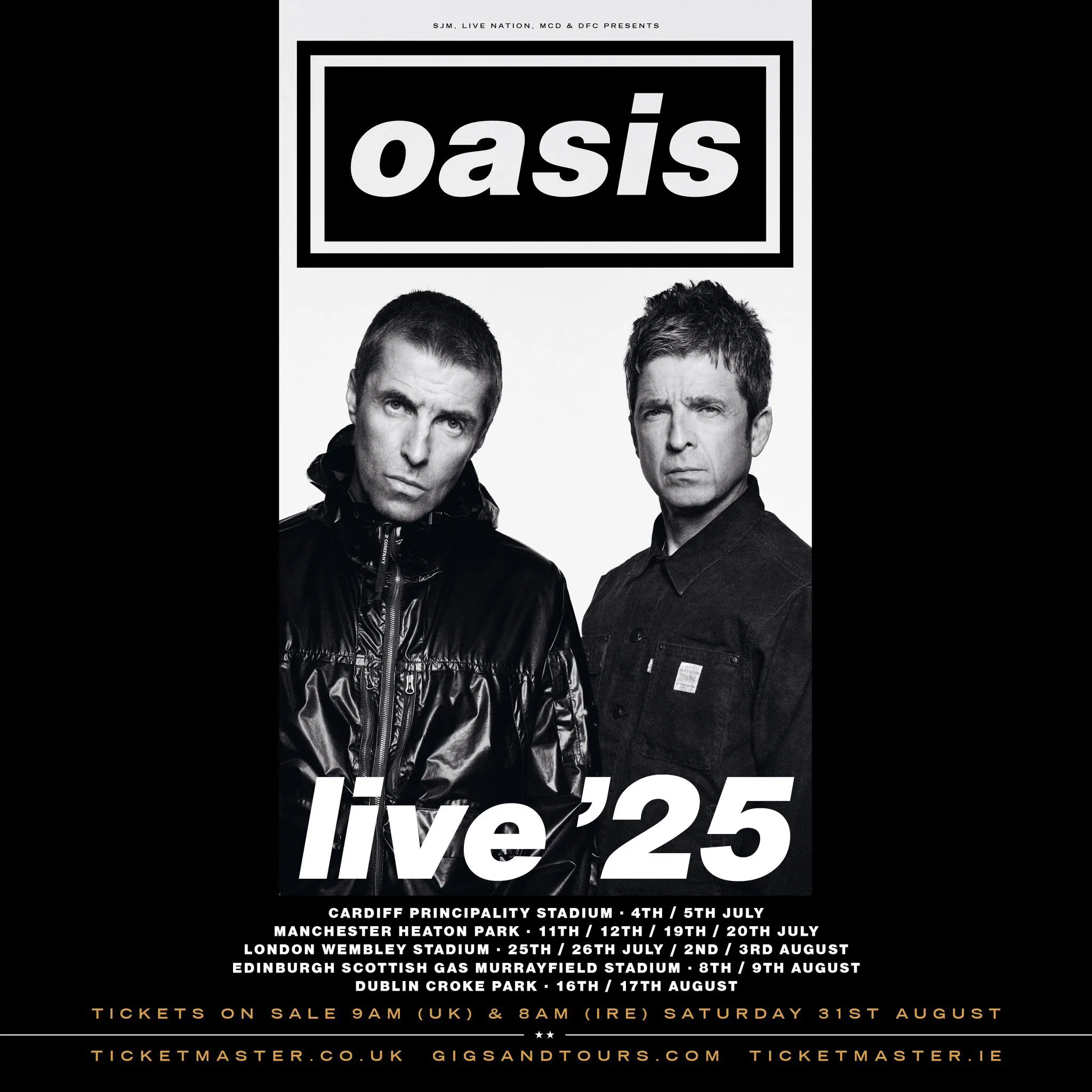
The Oasis Live 25 tour has been one of the most important musical events of the 21st Century. It's quite hard to put into words just how important Oasis are across the world.
So I guess I'd best answer the question, I've been putting it off. Who won?
If we look at it literally, Blur won the battle, Oasis won the war. Blur then comfortably won the 90s aftermath; 'Blur' is a far better album than 'Be Here Now', and '13' is also a brilliant record.
Both reunions were exceptional affairs, but if we look at it, the Oasis reunion was more of a surprise, after what had happened, and then when it did happen, the scale of it. Blur played 2 nights at Wembley Stadium, and Oasis ended up playing 7. There are more rumoured dates for Oasis to include a return to Knebworth.
I've got it scored at 2-2. This comes down to personal opinion, though. Blur, in my opinion, won. They innovated in sound and style, and with their reunions have gone on to release two new albums, both of which contain some great songs. 'The Ballad of Darren' in particular has some career highlights.
I give it to Blur. To be honest, though, if you ask me tomorrow, I may give it to Oasis. It's a battle that has been played out with music fans across decades. When doing this, I wanted to portray all elements of the bands' careers, comparing the two of them across two of their weakest tracks. I don't think it is a fair comparison.
As mentioned at the start, the Battle of Britpop became more than just the music, though; the media turned it into a class war. Inflated by people who wanted to sell newspapers and to get a story. I wanted to write this post from the perspective of a music fan; the band's upbringing, social class, and education shouldn't be used to point score.
Thank you for reading
Jack